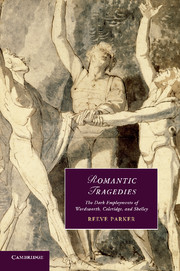Book contents
- Frontmatter
- Contents
- List of illustrations
- Acknowledgments
- Introduction: “Prowling out for dark employments”
- PART I WORDSWORTH
- CHAPTER 1 Reading Wordsworth's power: narrative and usurpation in The Borderers
- CHAPTER 2 Cradling French Macbeth: managing the art of second-hand Shakespeare
- CHAPTER 3 “In some sort seeing with my proper eyes”: Wordsworth and the spectacles of Paris
- CHAPTER 4 Drinking up whole rivers: facing Wordsworth's watery discourse
- PART II COLERIDGE AND SHELLEY
- Notes
- Bibliography
- Index
- CAMBRIDGE STUDIES IN ROMANTICISM
CHAPTER 1 - Reading Wordsworth's power: narrative and usurpation in The Borderers
Published online by Cambridge University Press: 05 May 2014
- Frontmatter
- Contents
- List of illustrations
- Acknowledgments
- Introduction: “Prowling out for dark employments”
- PART I WORDSWORTH
- CHAPTER 1 Reading Wordsworth's power: narrative and usurpation in The Borderers
- CHAPTER 2 Cradling French Macbeth: managing the art of second-hand Shakespeare
- CHAPTER 3 “In some sort seeing with my proper eyes”: Wordsworth and the spectacles of Paris
- CHAPTER 4 Drinking up whole rivers: facing Wordsworth's watery discourse
- PART II COLERIDGE AND SHELLEY
- Notes
- Bibliography
- Index
- CAMBRIDGE STUDIES IN ROMANTICISM
Summary
The study of human nature suggests this awful truth, that, as in the trials to which life subjects us, sin and crime are apt to start from their very opposite qualities, so are there no limits to the hardening of the heart, and the perversion of the understanding to which they may carry their slaves. During my long residence in France, while the Revolution was rapidly advancing to its extreme of wickedness, I had frequent opportunities of being an eye-witness of this process, and it was while that knowledge was fresh upon my memory, that the Tragedy of “The Borderers” was composed.
Wordsworth's 1842 NoteGiven the affective situations generally so prized by dramatists in the Romantic period in England, one might expect to find in that drama a congruence of interest in the powerful presence of voice and in the representation of character. Nor is it surprising, in criticism of Romantic drama, to find the text regarded as a transparency, providing as it were an image of the author, whose figure and “self” are discernible in the dramatic persons. But the fine early version of Wordsworth's The Borderers, when read in the context of his succeeding works and of aspects we can reconstruct of his and Coleridge's relationship, prompts considerations of the relation of work to author, of the shaping influence of dramatic representation, and of the role tale-telling voices play in art and life – considerations that call into question the adequacy of situational premises and familiar biographical analysis as critical and interpretive instruments.
- Type
- Chapter
- Information
- Romantic TragediesThe Dark Employments of Wordsworth, Coleridge, and Shelley, pp. 13 - 32Publisher: Cambridge University PressPrint publication year: 2011

